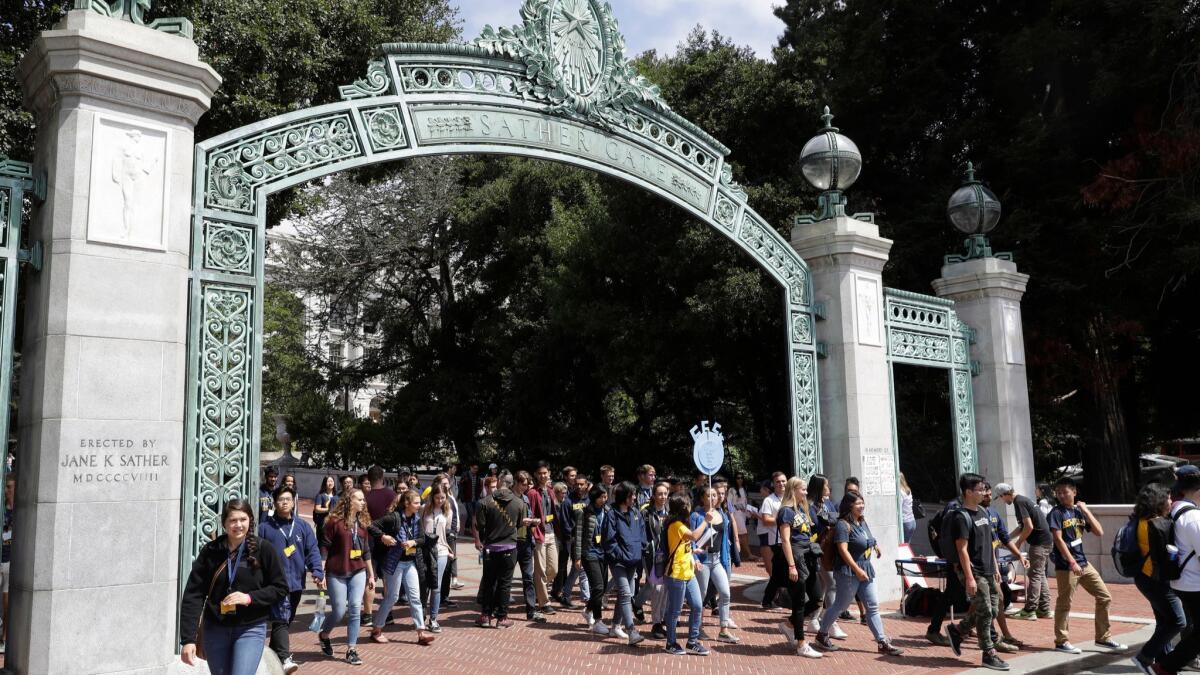Editorial: How to bolster the 1st Amendment on college campuses

- Share via
It was inevitable that legislators in Sacramento would join the debate over free speech on college campuses. It isn’t just that California has seen dramatic examples of censorship through violence, such as the rampage by 150 black-clad agitators in Berkeley last year that led to the cancellation of a speech by right-wing provocateur Milo Yiannopoulos. Legislators in California are also aware of incidents on college campuses in other parts of the country, private and public alike, in which speakers have been shouted down.
Nine bills have been introduced in Sacramento to respond to this problem, but most have little hope of enactment. For example, Democrats in the Assembly rightly sidelined a proposal by Assemblywoman Melissa Melendez (R-Lake Elsinore) that, among other provisions, would require punishment for students who disrupt speeches and withhold funding from campuses that failed to comply with a statewide policy on free speech.
We agree that students who repeatedly disrupt or shout down speakers should face discipline; but such behavior can already be punished under current regulations. At UC Berkeley, for example, students can be disciplined for “disruptive activity.” And of course, violent protests can be punished as violations of the criminal law. We see no reason why the state needs to intrude in the student disciplinary processes or threaten a withdrawal of funding.
Free expression and robust debate are indispensable to the academic mission.
But the state can nudge its institutions of higher learning to recommit themselves to free speech, and that’s the goal of the measure with the best chance of success. AB 2374, sponsored by Assemblymen Kevin Kiley (R-Rocklin) and Bill Quirk (D-Hayward), was drafted with advice from Erwin Chemerinsky, dean of the UC Berkeley School of Law, and Howard Gillman, chancellor of UC Irvine, authors of the recent book “Free Speech On Campus.”
The Kiley-Quirk bill would require campuses of the California State University and community college systems — and request the UC system — to disseminate statements affirming their commitment to free speech, including a promise to protect controversial speakers. The bill also would require campuses to supplement those statements with educational materials about the importance of free expression and to develop programs on the subject as part of student orientation and in other settings. (UC is “requested” to establish a free-speech policy because the legislature’s ability to issue mandates to the university is limited by the state Constitution.)
It should be unnecessary to remind students that universities are places where controversial, even offensive, ideas must be tolerated. Free expression and robust debate are indispensable to the academic mission. But commentators from across the political spectrum have remarked on the fact that many members of this generation of college students are skeptical of the idea of uninhibited free speech.
In their book, Chemerinsky and Gilman offer one explanation: A generation educated from a young age not to bully, they write, “has a strong and persistent urge to protect others against hateful, discriminatory or intolerant speech, especially in educational settings.” At the same time, they note, the “historic link between free speech and the protection of dissenters and vulnerable groups is outside the direct experience of today’s students.”
Ideally, enactment of AB 2374 will result in more students appreciating the historic connection between free expression and the protection of the rights of minorities and dissenters.
That the Kiley-Quirk bill has attracted bipartisan support is also important. There should be no Democratic versus Republican divide on whether universities should be bastions of free speech. But it’s a fact of contemporary political life that most of the prominent speakers who have been the targets of disruptive protests have been conservatives, while many of the protesters have been members or allies of marginalized groups. That creates a temptation for both political parties, and not just in California, to politicize what should be a nonpartisan commitment to free speech.
The legislature also should approve SB 1381, which is aimed at prohibiting the state’s public institutions of higher learning from limiting 1st Amendment activity to small “free speech zones.” The proposal by state Sen. Jim Nielsen (R-Gerber) would require larger outdoor areas on the campuses of public postsecondary educational institutions to be designated as public forums where students can assemble and distribute literature.
This bill addresses a real problem. In 2016, Kevin Shaw, president of a libertarian student group at Pierce College, was handing out Spanish-language copies of the U.S. Constitution on campus when he says he was stopped by a college administrator and told he could exercise his 1st Amendment rights only within a minuscule “free speech zone.”
Sacramento shouldn’t micromanage state institutions of higher education, but enactment of these two bills would help college and university administrators do what they should have been doing anyway: preaching and protecting freedom of speech.
Follow the Opinion section on Twitter @latimesopinionand Facebook
More to Read
A cure for the common opinion
Get thought-provoking perspectives with our weekly newsletter.
You may occasionally receive promotional content from the Los Angeles Times.










